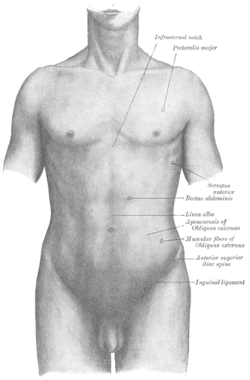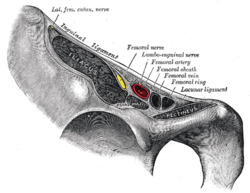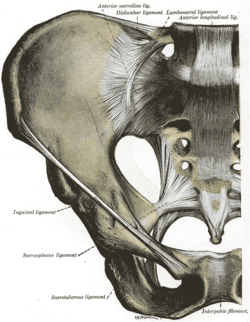Inguinal ligament
| Inguinal ligament | |
|---|---|
 Inguinal ligament is labeled at bottom right. | |
 Structures passing behind the inguinal ligament. Frontolateral view of the right side of the pelvis. | |
| Details | |
| From | anterior superior iliac spine |
| To | pubic tubercle |
| Identifiers | |
| Latin | Ligamentum inguinale |
| TA | A04.5.01.009 |
| FMA | 19855 |
The inguinal ligament (Poupart's ligament or groin ligament) is a band running from the pubic tubercle to the anterior superior iliac spine. Its anatomy is very important for operating on hernia patients.
Structure
It forms the base of the inguinal canal through which an indirect inguinal hernia may develop.
The inguinal (crural) ligament runs from the anterior superior iliac crest of the ilium to the pubic tubercle of the pubic bone. It is formed by the external abdominal oblique aponeurosis and is continuous with the fascia lata of the thigh.
There is some dispute over the attachments.[1]
Structures that pass deep to the inguinal ligament include:
- Psoas major, iliacus, pectineus
- Femoral nerve, artery, and vein
- Lateral cutaneous nerve of thigh
- Lymphatics
The midpoint of inguinal ligament is midpoint between the anterior superior iliac spine and pubic tubercle.
Function
The ligament serves to contain soft tissues as they course anteriorly from the trunk to the lower extremity. This structure demarcates the superior border of the femoral triangle.[2] It demarcates the inferior border of the inguinal triangle.
The midpoint of inguinal ligament is halfway between the anterior superior iliac spine and pubic tubercle. It's the landmark for the femoral nerve. The mid inguinal point is halfway between the anterior superior iliac spine and pubic symphysis. It's the landmark for femoral artery.
History
It is also referred to as Poupart's ligament, because François Poupart gave it relevance in relation to hernial repair, calling it "the suspender of the abdomen" (French: "le suspenseur de l'abdomen"). It is sometimes termed the Fallopian ligament. Colles' ligament is reflex ligament not inguinal ligament.[3][4]
Additional images
 Articulations of pelvis. Anterior view.
Articulations of pelvis. Anterior view.
 The subcutaneous inguinal ring.
The subcutaneous inguinal ring. Femoral sheath laid open to show its three compartments.
Femoral sheath laid open to show its three compartments.
 The relations of the femoral and abdominal inguinal rings, seen from within the abdomen. Right side.
The relations of the femoral and abdominal inguinal rings, seen from within the abdomen. Right side. The left femoral triangle.
The left femoral triangle. Posterior view of the anterior abdominal wall in its lower half. The peritoneum is in place, and the various cords are shining through.
Posterior view of the anterior abdominal wall in its lower half. The peritoneum is in place, and the various cords are shining through.- Inguinal ligament
- Inguinal ligament
See also
| Wikimedia Commons has media related to Inguinal ligament. |
References
- ↑ Acland RD (January 2008). "The inguinal ligament and its lateral attachments: correcting an anatomical error". Clin Anat. 21 (1): 55–61. PMID 18092366. doi:10.1002/ca.20579.
- ↑ Ryan, Jeffrey M.; Starkey, Chad (2002). Evaluation of orthopedic and athletic injuries. Philadelphia: F.A. Davis Co. ISBN 0-8036-0791-1.
- ↑ synd/2633 at Who Named It?
- ↑ F. Poupart. Chirurgie complète. Paris, 1695.
External links
- Anatomy figure: 12:03-02 at Human Anatomy Online, SUNY Downstate Medical Center - "Deep muscles of the anterior thigh."
- Anatomy photo:35:os-0107 at the SUNY Downstate Medical Center - "Anterior Abdominal Wall: Osteology and Surface Anatomy "
- Anatomy photo:35:08-0100 at the SUNY Downstate Medical Center - "Anterior Abdominal Wall: The Inguinal Ligament"
- Anatomy image:7179 at the SUNY Downstate Medical Center
- Anatomy image:7431 at the SUNY Downstate Medical Center
- Diagram at gensurg.co.uk